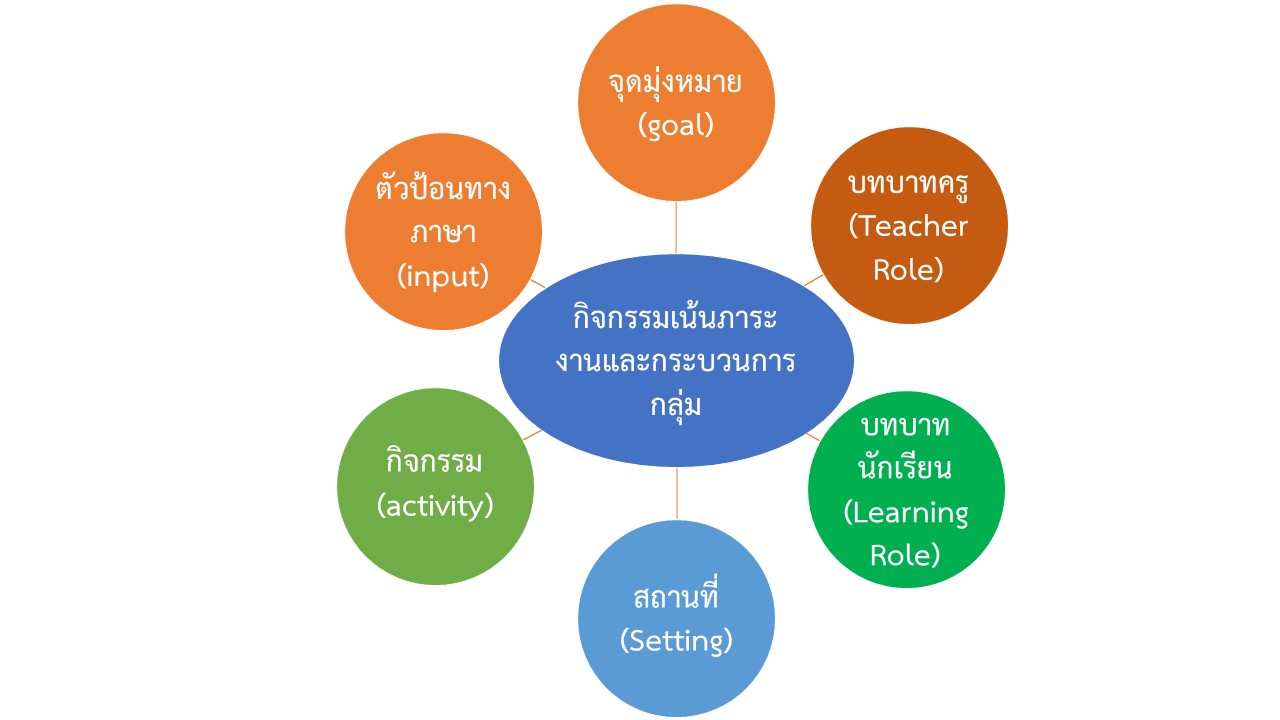การจัดการเรียนรู้โดยใช้รูปแบบเน้นภาระงานร่วมกับเทคนิคกระบวนการกลุ่มที่มีต่อการพัฒนาทักษะการฟัง - พูดภาษาจีนของนักเรียนชั้นมัธยมศึกษาปีที่ 5
Main Article Content
บทคัดย่อ
การวิจัยครั้งนี้ มีวัตถุประสงค์1) เพื่อเปรียบเทียบทักษะการฟังภาษาจีนหลังเรียนด้วยการจัดการเรียนรู้แบบเน้นภาระงานร่วมกับเทคนิคกระบวนการกลุ่มของนักเรียนชั้นมัธยมศึกษาปีที่ 5 กับเกณฑ์ร้อยละ 70 2) เพื่อเปรียบเทียบทักษะการพูดภาษาจีนหลังเรียนด้วยการจัดการเรียนรู้แบบเน้นภาระงานร่วมกับเทคนิคกระบวนการกลุ่มของนักเรียนชั้นมัธยมศึกษาปีที่ 5 กับเกณฑ์ร้อยละ 70 และ3) เพื่อศึกษาความพึงพอใจของนักเรียนต่อการจัดการเรียนรู้แบบเน้นภาระงานร่วมกับเทคนิคกระบวนการกลุ่มของชั้นมัธยมศึกษาปีที่ 5 กลุ่มตัวอย่างเป็นนักเรียนชั้นมัธยมศึกษาปีที่ 5/6 โรงเรียนโพธิ์คีรีราชศึกษา อำเภอโคกโพธิ์ จังหวัดปัตตานี ที่ลงทะเบียนเรียนวิชาภาษาจีน จำนวน 40 คน ได้มาจากการสุ่มกลุ่ม (Simple random sampling) โดยใช้ห้องเรียนเป็นหน่วยสุ่ม เครื่องมือที่ใช้ในการวิจัย ได้แก่ 1) แผนการจัดการเรียนรู้แบบเน้นภาระงานร่วมกับเทคนิคกระบวนการกลุ่มเพื่อพัฒนาทักษะการฟัง-พูดภาษาจีน 2) แบบทดสอบวัดทักษะการฟังภาษาจีนเรื่อง 食物 อาหาร 3) แบบทดสอบวัดทักษะการพูดภาษาจีน และ 4) แบบสอบถามความพึงพอใจ สถิติที่ใช้ในการวิจัย ได้แก่ ค่าร้อยละ ค่าเฉลี่ย ส่วนเบี่ยงเบนมาตรฐาน และทดสอบค่าที (Single Sample t- test) ผลการวิจัย พบว่า 1) นักเรียนชั้นมัธยมศึกษาปีที่ 5 โรงเรียนโพธิ์คีรีราชศึกษา อำเภอโคกโพธิ์จังหวัดปัตตานีมีทักษะการฟังภาษาจีนหลังการจัดการเรียนรู้แบบเน้นภาระงานร่วมกับเทคนิคกระบวนการกลุ่มสูงกว่าเกณฑ์ร้อยละ 70 อย่างมีนัยสำคัญทางสถิติที่ระดับ.01 2) นักเรียนชั้นมัธยมศึกษาปีที่ 5 โรงเรียนโพธิ์คีรีราชศึกษา อำเภอโคกโพธิ์จังหวัดปัตตานี มีทักษะการพูดภาษาจีนหลังการจัดการเรียนรู้แบบเน้นภาระงานร่วมกับเทคนิคกระบวนการกลุ่มสูงกว่าเกณฑ์ร้อยละ 70 อย่างมีนัยสำคัญทางสถิติที่ระดับ.01 และ3) นักเรียนชั้นมัธยมศึกษาปีที่ 5 โรงเรียนโพธิ์คีรีราชศึกษา อำเภอโคกโพธิ์ จังหวัดปัตตานี มีความพึงพอใจต่อการจัดการเรียนรู้แบบเน้นภาระงานร่วมกับเทคนิคกระบวนการกลุ่มภาพรวมอยู่ในระดับมาก
Article Details
เอกสารอ้างอิง
กระทรวงศึกษาธิการ. (2551). หลักสูตรแกนกลางการศึกษาขั้นพื้นฐาน พุทธศักราช 2551.กรุงเทพฯ: ชุมชนสหกรณ์การเกษตรแห่งประเทศไทย.
กานดา สุขสวัสดิ์. (2564). การเปรียบเทียบผลสัมฤทธิ์ก่อนเรียนและหลังเรียนวิชาภาษาอังกฤษ ชั้นมัธยมศึกษา ปีที่ 1. https://www.kroobannok.com/board_view.php?b_id=184264&bcat_id=16.
โชคชัย เตโช. (2562). การพัฒนาทักษะการพูดภาษาอังกฤษเพื่อการสื่อสารในชีวิตประจำวันโดยการจัดการเรียนรู้แบบเน้นภาระงานของนักเรียนชั้นประถมศึกษาปีที่ 5. วิทยานิพนธ์ ศึกษาศาสตรมหาบัณฑิตสาขาวิชาการสอนภาษาอังกฤษ มหาวิทยาลัยศิลปากร.
ณุรัตน์ แย้มฉาย. (2556). การจัดการเรียนรู้แบบเน้นภาระงานเพื่อพัฒนาความสามารถการพูดนำเสนอภาษาอังกฤษ สำหรับนักศึกษาปริญญาบัณฑิตชั้นปีที่ 1. สาขาวิชาการสอนภาษาอังกฤษ ปริญญาศึกษาศาสตรมหาบัณฑิต มหาวิทยาลัยศิลปากร.
ทิศนา แขมมณี. (2545). รูปแบบการเรียนการสอน: ทางเลือกที่หลากหลาย. กรุงเทพฯ : สำนักพิมพ์แห่งจุฬาลงกรณ์มหาวิทยาลัย.
นพพล จันทร์กระจ่างแจ้ง และสันติพงษ์ ทองดี. (2564). “การพัฒนาทักษะการจดจําคําศัพท์ภาษาจีนของนักเรียนชั้นมัธยมศึกษาปีที่ 5 โดยใช้การจัดการเรียนรู้แบบกลวิธีลินซ์ควบคู่กับการจัดการเรียนรู้แบบกระบวนการกลุ่ม”.วารสารมหาวิทยาลัยราชภัฏยะลา. 3 (กันยายน - ธันวาคม), 33-43.
บุญเชิด ภิญโญอนันตพงษ์. (2527). การทดสอบแบบอิงเกณฑ์: แนวคิดและวิธีการ. กรุงเทพฯ: โอ.เอส.พริ๊นส์ดิ้งเฮาส์.
ปรียนันท์ ทวีรัตน์. (2565). การจัดการเรียนรู้แบบเน้นภาระงานร่วมกับสื่อประสมที่มีต่อความสามารถในการฟัง-พูดภาษาจีน ของนักเรียนชั้นประถมศึกษาปีที่ 1 โรงเรียนกอบกาญจน์ศึกษามูลนิธิจังหวัดสงขลา. การค้นคว้าอิสระ ครุศาสตร์มหาบัณทิต สาขาวิชาหลักสูตรและการสอน มหาวิทยาลัยราชภัฎสงขลา.
โรงเรียนโพธิ์คีรีราชศึกษา. (2563). รายงานประจำปีและรายงานการประเมินตนเอง โรงเรียนโพธิ์คีรีราชศึกษา. ปัตตานี. (เอกสารสำเนา).
สุชาดา ปิติพร. (2559). การพัฒนาการคิดวิเคราะห์ในวิชาภาษาไทย (สาระที่ 5 วรรณคดีวรรณกรรม) โดยใช้กระบวนการกลุ่ม. วิทยานิพนธ์ปริญญามหาบัณฑิต มหาวิทยาลัยธุรกิจบัณฑิตย์.
สุริยะ หาญพิชัย. (2563). การพัฒนาผลสัมฤทธิ์ทางการเรียนโดยใช้การเรียนรู้ด้วยกระบวนการกลุ่มในรายวิชาสถานการณ์โลก ปัจจุบัน. วารสารลวะศรี มหาวิทยาลัยราชภัฏเทพสตรี 4 ฉบับที่ 1.
เสาวคนธ์ จันต๊ะมาต .(2565). การใช้กิจกรรมบทบาทสมมุติเพื่อพัฒนาทักษะการพูดภาษาจีนของนักศึกษา. วารสารศึกษาศาสตร์ มหาวิทยาลัยบูรพา. ปีที่ 33 ฉบับที่ 1.
อรวรรณ สินารุณ. (2560). การสอนภาษาที่เน้นภาระงานเพื่อส่งเสริมความสามารถในการฟังพูดภาษาอังกฤษและความมั่นใจ ในตนเองของนักเรียนชั้นประถมศึกษาปีที่ 3. วิทยานิพนธ์ศึกษาศาสตรมหาบัณฑิต สาขาวิชาหลักสูตรการสอนและเทคโนโลยีการเรียนรู้ มหาวิทยาลัยเชียงใหม่.
Ellis, R. (2003). Task-Based Language Learning and Teaching. Oxford: Oxford University Press.
Krashen, S., and Terrell, T. (1983). The Natural Approach: Language Acquisition in the Classroom. Oxford: Pergamon.
Willis, D., and Willis, J. (2007). Doing Task-Based Teaching. Oxford: Oxford University Press.
Slavin, R.E. (1990). Cooperative Learning: Research and Practice. Englewood Cliffs,NJ: Prentice-Hall.
Qiu, X., & Xu, J. (2022). " Listening should be done communicatively": Do task-supported language teaching and post-task self-reflection facilitate the development of L2 listening proficiency? System, 109, 102897.
Wei, R., & Zhao, X. (2024). Effects of task-based language teaching on functional adequacy in L2 writing. Assessing Writing, 60, 100838


